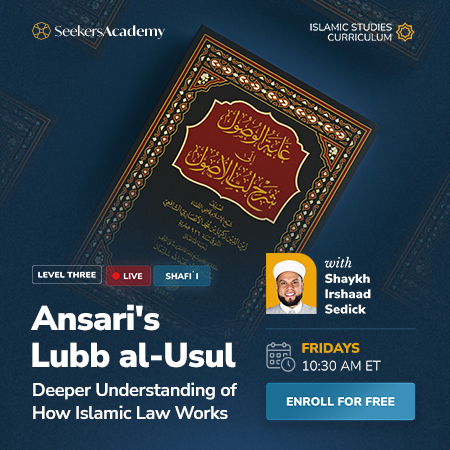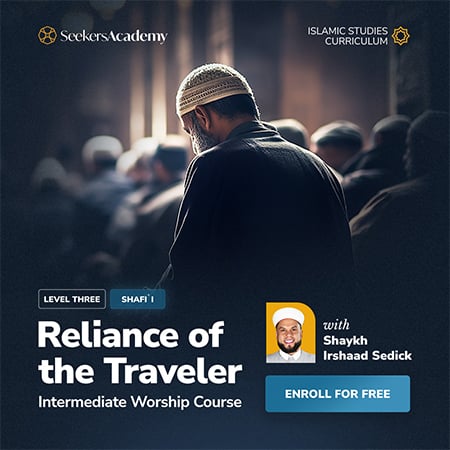
Lubb Al-Usul is traditionally considered as an intermediate to advanced level of study, and has, therefore, been included in our level three curriculum.
Shaykh Al-Islam Zakariyya al-Ansari was a leading Islamic scholar of the 15th century, who specialized in Shafi‘i Fiqh, Usul Al-Fiqh, and Tasawwuf. He was born in or around 1420 CE, in Sunaika, located in the Egyptian province of Sharqiyya. During his adolescence, al- Ansārī moved to Cairo to study at al-Azhar University. Al- Ansārī studied under al-Qāyāti, Ibn Hajar al-Asqalāni, Jalāl al-Dīn al Mahallī and Sharaf al-Din al Munawi.
Some of Ansari's most famous works include: Manhaj al-Tullab , Fath al-Wahhab , Tuhfat al-Tullab, Lubb al-Usul, it's Commentary - Ghayat al-Wusul, and his commentary on al-Qushairī's Risāla fī ‘l-tasawwuf.
Lubb al-Usul is a classical work on intermediate Shafi‘i Usul al-Fiqh and, therefore, forms part of traditional Shafi‘i syllabuses across the Muslim world.
The objective of this study is to understand Sacred Law in greater detail by expanding upon the basic concepts covered in earlier levels. Once a student can grasp the internal framework of Legal Theory (Usul Al-Fiqh) upon which Sacred Law is based, they will develop a deeper appreciation and understanding of Sacred Law.
This is an intermediate-level class in Shafi’i fiqh (Level Three). It is therefore essential for students to have completed the study of Imam Haramayn’s Waraqat or its equivalent.
This course will assist the student to understand common Sacred Law nomenclature as well as how the Mujtahid arrives at the detailed rulings of Sacred Law.
- Teacher: Mawlana Irshaad Sedick
This important text, Lubb Al-Usul, along with its Commentary, Ghayat Al-Wusul, also by Shaykh Al-Islam Zakariyya Al-Ansari, comprehensively covers the entire spectrum of Shafi‘i Usul Al-Fiqh. Usul Al-Fiqh or Legal Theory comprises the study of the sources of Sacred Law, the methodology of extrapolating the law from its sources, and details about the Mujtahid.
The concise work, Lubb Al-Usul, facilitates a comprehensive coverage of key concepts and details before venturing into larger voluminous works. The course text is highly recommended by traditional Shafi‘i Scholars and institutions for intermediate to advanced students and is well-placed after a study of Al-Waraqat by Imam Al-Haramayn. The main commentary of Lubb Al-Usul is the author’s own, Ghayat Al-Wusul ila Sharh Lubb Al-Usul.
- This course is for ages 18-100.
- It is particularly beneficial for Students of the Shafi‘i School.
- It is a Level Three course. In order to successfully complete this course, students should first complete Usul al-Fiqh: How Islamic Law is Derived and Interpreted: Juwayni's Waraqat.
- This course can also be taken by anyone who is interested in learning more about the systematic thinking and methodology of traditional Mujtahids.
- Understand the full spectrum of concepts within the subject of Usul Al-Fiqh (Legal Theory).
- Understand the framework upon which Sacred Law (Fiqh) is based.
- Understand the methodology of the Mujtahidun in deriving detailed Fiqh rulings.
- Analyze concepts within Fiqh in light of the framework of Usul Al-Fiqh
- Understand how the sources of Sacred Law can present solutions to all current and future novel situations that Muslims may face.

This is a Level Three course based on the text Reliance of the Traveller and Tools of the Worshipper. This course covers the chapters on Worship taught by Shaykh Irshaad Sedick. The entire text is co-taught with Shaykh Muhammad Carr who covers the chapters on Contract Law and Commercial Law in the course:
Reliance of the Traveller: Intermediate Contract Law and Commercial Law
course.‘Reliance’ means ‘that which is depended upon,’ since the author meant that this text should be a reliable resource work for whoever goes by it because it aims to present the most dependable (rajih) positions of the Shafi`i School and omit the weak ones. This course, therefore, aims to comprehensively explain the corpus of dependable views that make up the “Official Shafi`i School” before venturing into the detailed elaboration thereof and alternative views in the School, in the Minhaj of Imam Nawawi. Students who complete this level will, if Allah wills, be thoroughly prepared for the higher levels of Sacred Law from the Shafi`i School.
By covering this text (and the earlier introductory texts) thoroughly, students should have a solid understanding of the Shafi`i School’s Fiqh framework. Having an internalized framework to refer to facilitates a contextual understanding of more advanced and atomistic matters of Sacred Law.
- Teacher: Mawlana Irshaad Sedick
‘Umda Al-Salik wa ‘Uddat Al-Nasik (Reliance of the Traveller and Tools of the Worshipper) is an indispensable text, especially for Shafi`i students of Sacred Law because it comprehensively summarizes the main views in the Shafi`i School. The author (may Allah have mercy on him) thoroughly covers the entire spectrum of Fiqh in systematic order. He provides a balance of detail so that the text, though not elementary enough to be called beginner-level, is neither too loaded nor too challenging to be categorized as advanced.
Al-Misri based his work on the earlier Shafi`i works of Imam Nawawi and Imam Abu Ishaq Al-Shirazi, following the format of Shirazi’s Muhadhdhab (The Rarefaction) and the conclusions of Nawawi’s Minhaj at-Talibin (The Seeker’s Road).
In the words of the author, this text “is a summary of the School of Imam Shafi`i (may Allah have mercy on him) in which I have confined myself to the most reliable positions (rajih) of the School, according to Imam Rafi’i and Imam Nawawi, or according to just one of them. I may mention a difference of opinion herein, this being when their recensions contend, giving Nawawi’s position first and then, as opposed to it, that of Rafi’i.” Based on the above, this text is ideal for the intermediate student of the Seekers Islamic Studies Curriculum.
The commentaries on this text are:
1. Fayd Al-Ilah Al-Malik fi Hall Alfaz ‘Umda Al-Salik wa ‘Uddat Al-Nasik by ‘Umar Barakat (d. after 1307/1890)
2. Anwar Al-Masalik Sharh ‘‘Umda Al-Salik wa ‘Uddat Al-Nasik by Muhammad Al-Zuhri Al-Ghamrawi
The most reliable and comprehensive Sharh of the course text is:
3. Fath Al-Wahhab Al-Malik fi Hall Alfaz ‘Umda Al-Salik wa ‘Uddat Al-Nasik by Taha Ibn ‘Abd Al-Hamid Ibn Muhammad Hamadi
- This course is for intermediate students (approximately eighteen years and older).
- Students of Sacred Knowledge who desire to dive deeper into Sacred Law and Muslims who are serious about knowing the details of Sacred Law to practice it thoroughly and correctly are ideally suited for this course.
- This is a level Three course in Shafi`i fiqh which adequately prepares a student to study the Minhaj al-Talibin of Imam Nawawi. It is therefore essential for students to have completed the study of the following courses or equivalent: Al-Risala Al-Jami’a (Habashi’s Encompassing Epistle Explained), Al-Mukhtasar (Ba Fadl’s The Short Abridgement), Matn Abi Shuja’ with experience reading from Ibn Qasim’s commentary with its Hashiya by Imam Bajuri. Recommended Text: Safina al-Naja, Al-Muqaddima Al-Hadramiyya with experience reading from one of its commentaries such as Bushra Al-Karim.
- It is particularly beneficial for teachers, parents, and young adults.
- It can also be taken by anyone with a keen interest in the details and precision of Law, especially Sacred Law (Fiqh), and how it works.
- Understand and be aware of the full spectrum A-Z of chapters, subjects, topics, and basic details of the most reliable views of the Shafi`i School.
- Understand the rational framework of Sacred Law according to the Shafi`i School.
- Analyze whether one’s practice is valid according to the specifications of the Shafi`i School.
- Understand and Apply some of the basic underlying principles (Qawa’id) of Shafi`i Fiqh.
- Memorize the basic historical typography of the Shafi`i School and understand where the most authoritative scholars and books fit therein.
- Memorize the basic framework and order of chapters, sub-chapters, and topics of Fiqh.
- Understand and memorize the most important views of the Shafi`i School.

This is a Level Three course based on the text Reliance of the Traveller and Tools of the Worshipper. This course covers the chapters on Contract Law and Commercial Law taught by Shaykh Muhammad Carr. The entire text is co-taught with Shaykh Irshaad Sedick who covers the chapters on Worship in the course:
Reliance of the Traveller: Intermediate Worship Course
This course aims to adequately prepare students to study the Minhaj Al-Talibin of Imam Nawawi (may Allah have mercy on him). It is, therefore, essential for students to have completed the study of elementary-level primers before enrolling in this course.
‘Reliance’ means ‘that which is depended upon,’ since the author meant that this text should be a reliable resource work for whoever goes by it because it aims to present the most dependable (rajih) positions of the Shafi`i School and omit the weak ones. This course, therefore, aims to comprehensively explain the corpus of dependable views that make up the “Official Shafi`i School” before venturing into the detailed elaboration thereof and alternative views in the School, in the Minhaj of Imam Nawawi. Students who complete this level will, if Allah wills, be thoroughly prepared for the higher levels of Sacred Law from the Shafi`i School.
By covering this text (and the earlier introductory texts) thoroughly, students should have a solid understanding of the Shafi`i School’s Fiqh framework. Having an internalized framework to refer to facilitates a contextual understanding of more advanced and atomistic matters of Sacred Law.
- Teacher: Shaykh Muhammad Carr
‘Umda Al-Salik wa ‘Uddat Al-Nasik (Reliance of the Traveller and Tools of the Worshipper) is an indispensable text, especially for Shafi`i students of Sacred Law because it comprehensively summarizes the main views in the Shafi`i School. The author (may Allah have mercy on him) thoroughly covers the entire spectrum of Fiqh in systematic order. He provides a balance of detail so that the text, though not elementary enough to be called beginner-level, is neither too loaded nor too challenging to be categorized as advanced.
Al-Misri based his work on the earlier Shafi`i works of Imam Nawawi and Imam Abu Ishaq Al-Shirazi, following the format of Shirazi’s Muhadhdhab (The Rarefaction) and the conclusions of Nawawi’s Minhaj at-Talibin (The Seeker’s Road).
In the words of the author, this text “is a summary of the School of Imam Shafi`i (may Allah have mercy on him) in which I have confined myself to the most reliable positions (rajih) of the School, according to Imam Rafi’i and Imam Nawawi, or according to just one of them. I may mention a difference of opinion herein, this being when their recensions contend, giving Nawawi’s position first and then, as opposed to it, that of Rafi’i.” Based on the above, this text is ideal for the intermediate student of the Seekers Islamic Studies Curriculum.
The commentaries on this text are:
1. Fayd Al-Ilah Al-Malik fi Hall Alfaz ‘Umda Al-Salik wa ‘Uddat Al-Nasik by ‘Umar Barakat (d. after 1307/1890)
2. Anwar Al-Masalik Sharh ‘‘Umda Al-Salik wa ‘Uddat Al-Nasik by Muhammad Al-Zuhri Al-Ghamrawi
The most reliable and comprehensive Sharh of the course text is:
3. Fath Al-Wahhab Al-Malik fi Hall Alfaz ‘Umda Al-Salik wa ‘Uddat Al-Nasik by Taha Ibn ‘Abd Al-Hamid Ibn Muhammad Hamadi
- This course is for intermediate students (approximately eighteen years and older).
- Students of Sacred Knowledge who desire to dive deeper into Sacred Law and Muslims who are serious about knowing the details of Sacred Law to practice it thoroughly and correctly are ideally suited for this course.
- This is a level Three course in Shafi`i fiqh which adequately prepares a student to study the Minhaj al-Talibin of Imam Nawawi. It is therefore essential for students to have completed the study of the following courses or equivalent: Al-Risala Al-Jami’a (Habashi’s Encompassing Epistle Explained), Al-Mukhtasar (Ba Fadl’s The Short Abridgement), Matn Abi Shuja’ with experience reading from Ibn Qasim’s commentary with its Hashiya by Imam Bajuri. Recommended Text: Safina al-Naja, Al-Muqaddima Al-Hadramiyya with experience reading from one of its commentaries such as Bushra Al-Karim.
- It is particularly beneficial for teachers, parents, and young adults.
- It can also be taken by anyone with a keen interest in the details and precision of Law, especially Sacred Law (Fiqh), and how it works.
- Understand and be aware of the full spectrum A-Z of chapters, subjects, topics, and basic details of the most reliable views of the Shafi`i School.
- Understand the rational framework of Sacred Law according to the Shafi`i School.
- Analyze whether one’s practice is valid according to the specifications of the Shafi`i School.
- Understand and Apply some of the basic underlying principles (Qawa’id) of Shafi`i Fiqh.
- Memorize the basic historical typography of the Shafi`i School and understand where the most authoritative scholars and books fit therein.
- Memorize the basic framework and order of chapters, sub-chapters, and topics of Fiqh.
- Understand and memorize the most important views of the Shafi`i School.